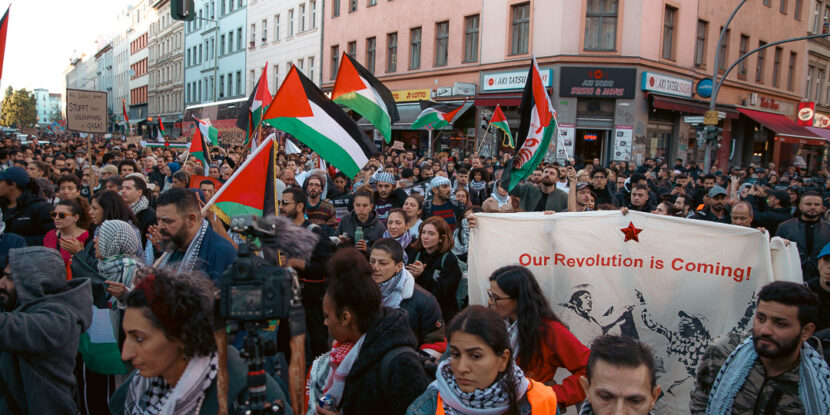
PULSE POINTS:
❓What Happened: A study by the University of Münster reveals that nearly 20 percent of Muslim migrants in Germany may be susceptible to radicalisation.
👥 Who’s Involved: Researchers from the University of Münster, German Chancellor Friedrich Merz, and Interior Minister Alexander Dobrindt.
Your free, daily feed from The National Pulse.
📍 Where & When: Germany, study results released last week; border policy changes implemented in May 2025.
💬 Key Quote: Sarah Demmrich stated, “With the emotional state of resentment, we were able to uncover a new and even strong factor in radicalisation.”
⚠️ Impact: The findings suggest up to one million individuals could be vulnerable to radicalisation, amidst tightened border controls and migration policy reforms in Germany.
IN FULL:
A new study conducted by the University of Münster’s Research Centre for Islamic Theology has found that nearly 20 percent of Muslim migrants in Germany could be vulnerable to radicalisation. The survey, which included almost 1,900 participants with a migration background, highlighted strong anti-Western and anti-Semitic sentiments, as well as resentment toward German politics and societal norms.
The term “migration background” in Germany refers to both first-generation migrants and their descendants. With over 5.5 million Muslims in this category nationwide, the findings suggest that up to one million individuals could be at risk of radicalisation. Researchers also noted that a third of those identified as vulnerable expressed support for violence in response to perceived injustices against Muslims. Additionally, many respondents viewed Islamic Sharia law as superior to German law and expressed a desire for Islam to be the dominant political authority in Germany.
Sarah Demmrich, a religious psychologist involved in the study, explained to German outlet NOZ that “resentment” was identified as a significant factor in the radicalisation process. The researchers found that the clash between Germany’s more liberal Western cultural norms and the strict religious beliefs of Muslim migrants is a primary driver of the sort of resentment that fuels radicalization. “The capacity for criticism within Islam must be strengthened in order to promote reflective debates on religious and social issues,” Demmrich contends.
This research comes as Germany implements somewhat stricter migration controls under newly elected Chancellor Friedrich Merz. Merz has rescinded the open-border policies introduced by former Chancellor Angela Merkel, a fellow member of the Christian Democratic Union (CDU) party, in 2015. Under the new rules, illegal migrants, except for children and pregnant women, are being turned away at Germany’s borders. Merz has also initiated measures to deport Syrian migrants following the collapse of Bashar al-Assad’s regime last year.
Interior Minister Alexander Dobrindt has announced a significant expansion of border enforcement, increasing personnel by 3,000 to a total of 14,000 officers. Speaking on the new measures, Dobrindt stated, “We want to take stronger steps against illegal immigration… The numbers remain significantly too high.”
Merz has defended the policy shift, asserting that the European Union (EU) must send a clear message to deter illegal immigration and disrupt smuggling networks. Recent attacks in Germany, including a fatal stabbing in Bavaria last December, have intensified public focus on migration and security issues.

PULSE POINTS:
❓What Happened: A court in Britain has convicted a man for burning the Islamic Quran during a protest outside the Turkish consulate, igniting backlash from free speech advocates who say the ruling revives the country’s defunct blasphemy laws.
👤Who’s Involved: Hamit Coskun, Westminster Magistrates’ Court, Judge John McGarva, the Crown Prosecution Service, the Free Speech Union.
Your free, daily feed from The National Pulse.
🧾Key Quote: “This decision is wrong. It revives a blasphemy law that Parliament repealed,” said Robert Jenrick, Shadow Justice Secretary.
⚠️Fallout: Coskun’s conviction under the Public Order Act for “religiously aggravated disorderly conduct” drew sharp criticism from civil liberties groups and sparked plans for a legal appeal, potentially reaching the European Court of Human Rights.
📌Significance: The case underscores growing concerns over free speech in the United Kingdom, where critics argue religious sensitivities are being prioritized over basic protest rights—particularly when it comes to Islam.
IN FULL:
A British court has found 50-year-old atheist Hamit Coskun guilty of a “religiously aggravated public order offence” after he publicly burned a copy of the Quran during a political protest in central London. Coskun, an Armenian-Kurdish asylum seeker who fled Turkey citing persecution, was convicted on Monday at Westminster Magistrates’ Court after a one-day trial.
The February 13 demonstration took place outside the Turkish consulate in Knightsbridge, where Coskun shouted “Islam is religion of terrorism” and “F**k Islam” while holding the burning Islamic text over his head. Moments later, he was violently attacked by a passerby who appeared to slash at him with a blade and kicked him to the ground. That man is due to stand trial in 2027.
Despite claims from the Crown Prosecution Service (CPS) that Coskun was not prosecuted for destroying the book in itself, but for the “disorderly” nature of burning the book, the case has reignited a fierce debate over whether the United Kingdom is reintroducing blasphemy laws by stealth. Initially, Coskun was charged with harassing the “religious institution of Islam,” with the charges being revised after public outcry.
Judge John McGarva acknowledged flaws in the original CPS charge, which referred to Islam “as if it was a person,” but upheld the revised charge. He rejected arguments from Coskun’s defense team that his protest was aimed at criticizing a religion, not its followers, and therefore protected speech.
“You don’t distinguish between the two,” McGarva insisted during sentencing. “I find you have a deep-seated hatred of Islam and its followers.”
Coskun was fined £240 (~$325) and is currently in hiding.
The Free Speech Union (FSU) and the National Secular Society (NSS), both of which funded Coskun’s defense, condemned the ruling and announced plans to appeal. “This is deeply disappointing,” the FSU said in a statement. “Religious tolerance doesn’t require non-believers to respect the blasphemy codes of believers.”
Robert Jenrick, Shadow Justice Secretary and former immigration minister, said the court’s decision “revives a blasphemy law that Parliament repealed,” adding: “Free speech is under threat. I have no confidence in Two-Tier Keir [Starmer] to defend the rights of the public to criticise all religions.”
The United Kingdom repealed its last formal blasphemy statutes in 2008, but recent prosecutions under the Public Order Act—particularly those involving Islam—have alarmed critics who argue religious protections are being selectively enforced.
Coskun, who had fled Turkey under President Recep Tayyip Erdoğan’s Islamist regime, testified that his protest was a direct response to government oppression in his home country. His lawyer, Katy Thorne KC, said the ruling effectively criminalizes any public burning of a religious book, regardless of motive or message, warning that it “chills the right of citizens to criticise religion.”
The FSU has pledged to appeal the ruling all the way to the European Court of Human Rights if necessary.
show less

 3 weeks ago
1
3 weeks ago
1








 English (US) ·
English (US) ·